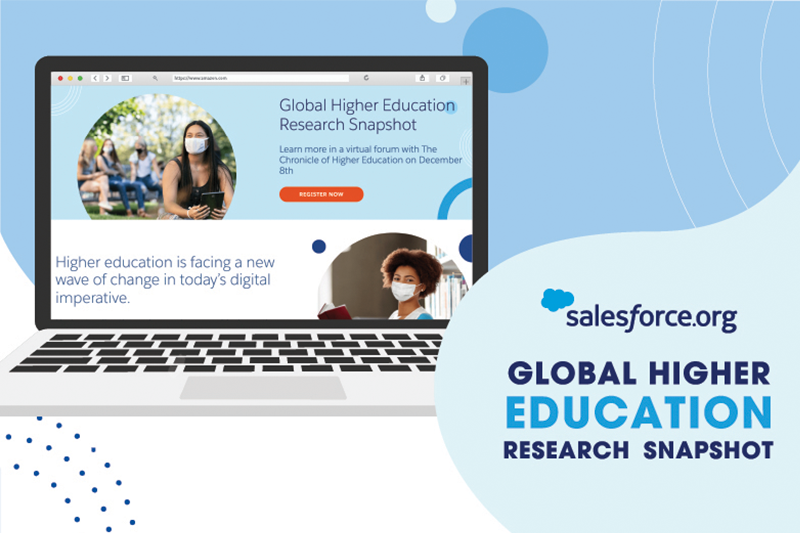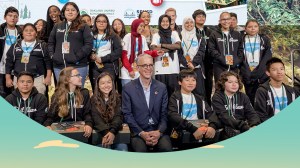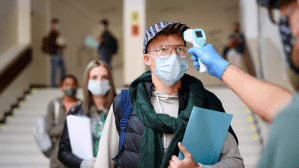In a time of virtual learning and social distancing, it might be surprising to learn that many students say they feel more connected to their campus community than before.
The Salesforce.org Global Higher Education Research Snapshot, released today, found that even during these times, when many campuses are empty and classrooms are often conducted via videoconferencing, a higher percentage of students around the world say they feel more connected to advisors (31%), faculty members (32%), and fellow students (34%) than those who say they feel less connected (21%, 20%, and 25%, respectively).

Fostering connection for students during a time of social distancing has been a priority for many educational institutions as they work to support students in this new learn-from-anywhere world.
When the pandemic hit, University of St. Thomas recognized the urgency of keeping students connected with academic advising, disability resources, and tutoring services to foster community. They quickly created a new system for advising scheduling and ramped up their communications to keep students informed, connected, and safe, both during a period of all-virtual learning and as they reopened campus.
Communications to support holistic wellbeing
According to the Global Higher Education Research Snapshot, 75% of students would like to receive pandemic-related communications on a weekly basis or more often from their institution.
Under communication was not an option for St. Thomas. In mid-March, the university jumped into action with a pandemic response plan that included regular personalized communications to keep students apprised of their plans and provide support resources.
After the university decided to go remote, they sent more than 4,400 messages to students from March 16 to June 15. With many students transitioning from regular human contact to no human contact and a lack of natural support that comes from being on a college campus, this outreach was intended to engage students and let them know that St. Thomas still cared for their well-being as part of the community.
When it resumed in-person classes in the fall, St. Thomas needed to ensure its students understood the importance of following new protocols such as wearing face coverings and social distancing. St. Thomas students were asked to sign a “Common Good Commitment” via a tailored campaign powered by Marketing Cloud. In order to keep track of the commitments and ensure full completion of the forms, data was fed into Salesforce and automated reminders were sent using Marketing Cloud to those who had not signed the commitment.
University of St. Thomas also continued to keep in touch with students via text message, leveraging a Mercury SMS integration so any responses would feed directly back to the student contact record in Salesforce. Getting student buy-in on the Common Good Commitment ensured that all students recognized their role in the campus preparedness plan.
Being proactive in our efforts to control COVID-19 on campus meant that we needed a strong contact tracing process…[Salesforce] became the solution
Ryan Blake, University of St Thomas’ CRM Director
University of St. Thomas also focused on proactive control of COVID-19 on campus by implementing a contact tracing system.
“The holistic well-being of students was top of mind as St. Thomas reopened. Being proactive in our efforts to control COVID-19 on campus meant that we needed a strong contact tracing process. While Salesforce was not a part of the initial conversation, it became the solution,” said Ryan Blake, University of St. Thomas’ CRM Director.
Within four days, Blake and his team developed an integrated contact tracing application on Salesforce, exchanging frequent communication with students through email and SMS. They deployed the application immediately and had 29 contact tracers up and running on the platform.
While none of the 29 contact tracers had any Salesforce case management experience, screen flows and guided processes in Salesforce minimized the learning curve and allowed for an efficient contact tracing system off the bat. The team sent daily text messages to check in on students in isolation and quarantine and to provide helpful resources ranging from mental health services to financial aid information.
While 30% of student global respondents in the Salesforce.org higher education research reported that they don’t feel safe returning to campus, St. Thomas’ immediate action plan helped to support holistic wellbeing while also building trust across the institution during uncertain times.
Fostering virtual connection
The new Salesforce.org higher education research found that a third of students identified virtual advising as extremely useful during the pandemic. In order to keep up advising services through the pandemic, University of St. Thomas created an advising scheduling system that integrates staff’s calendars, Zoom, and Salesforce.
In Salesforce, they created personalized links for integrated scheduling, allowing students to schedule appointments without filling out forms or requiring a login. St. Thomas’ communications team conducted a mass outreach campaign to their campus community using Marketing Cloud. This allowed students to receive communications about advising services on a personal level, while quickly getting the message out at scale.
When COVID hit, because we had some level of digital maturity, we were able to leverage and extend our existing tools to accomplish new tasks and goals on the Salesforce platform. Our time to innovate was significantly less because we already had the tools in our environment.”
Ryan Blake, University of St Thomas’ CRM Director
In addition to connecting with advisors, students are relying on online communities to stay connected during this time. The new Salesforce.org higher education research found that 30% of students say online communities make them feel more connected to other students, and 29% say they help them feel more connected with school instructors.
Resilience through digital transformation
University of St. Thomas’ efforts in supporting students throughout the pandemic was supported by their existing digital infrastructure.
“When COVID hit, because we had some level of digital maturity, we were able to leverage and extend our existing tools to accomplish new tasks and goals on the Salesforce platform. Our time to innovate was significantly less because we already had the tools in our environment,” Blake shared.
With a robust digital toolkit, all powered by Salesforce, University of St. Thomas was able to pivot quickly and drive impact in less time all while keeping students safe and connected.
Learn more about the latest trends in higher education in the Salesforce.org Global Higher Education Research Snapshot.


















